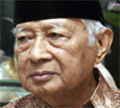
The body of the former Indonesian President Suharto widely known for his dictatorship was buried on Monday at a state funeral in his family’s mausoleum complex Astana Giribangun in Karanganyar regency in his hometown of Solo in central Java. He was buried next to his wife Siti Suhartinah, who died in 1996.
He was died on Sunday at the age of 86 after suffering multiple organ failure. He was admitted to Pertamina hospital at Jakarta, where was admitted for treatment more than three years ago.
A small military ceremony supplemented by a traditional Javanese ritual by his family members was held before the coffin kept in palace premises, which were brought out by eight soldiers, was flown to central Java via an air force base in Jakarta.
Ceremony at the mausoleum was commenced by the Indonesian President Susilo Bambang Yudhoyono, who declared national mourning for a week.
A long reading of Suharto’s military accomplishments during the funeral ceremony was followed by a shot fired in his honour and the present President saluted the former president.
"We offer his body to the motherland," the Indonesian president said. "His service is an example to us."
"I invite all the people of Indonesia to pray that may the deceased's good deeds and dedication to the nation be accepted by Allah the almighty," he said in an address to the nation at television.
On Monday morning hundreds of dignitaries and old friends had flocked to the mausoleum to pay their last homage to a man, which was admired as one of Asia's longest-serving leaders and hated as the worst kleptocrats of the 20th century. Millions nationwide held prayer services and cited verses from the Koran for Suharto.
"My father has returned to God," said Suharto's eldest daughter Siti Hadijanti Rukmana in a news conference at the hospital.
Suharto's condition had fluctuated since being admitted to hospital 23 days ago. At one-point doctors said he was making an amazing recovery.
Suharto’s Political Record
Suharto ascended to power after he guided the military in 1965 against an attempted communist coup. Up to 5,00,000 people were killed in an anti-communist elimination in the months followed the coup.
The next three decades following the coup, Suharto's armed forces committed multiple human rights abuses, killing student activists, criminals, and opponents of the regime in the rebellious provinces of Aceh and Papua, and also in East Timor, which did he invade in 1975.
He was forced to step down in 1998 amid widespread protests triggered by the impact of the Asian financial crisis.
He was also accused of drawing off billion of dollars of state funds and accumulating into his own secret bank accounts.
As per corruption watchdog ‘Transparency International’ Suharto and his family misused up to $35 billion during his 32 years of reign.
Although dogged by allegations of corruption, political authoritarianism, and serious human rights violation, Suharto, who ruled the country for 32 years, was also credited with leading his country from poverty to prosperity.
|
|
Read More: East Godavari


Comments: